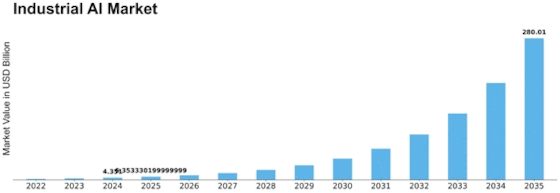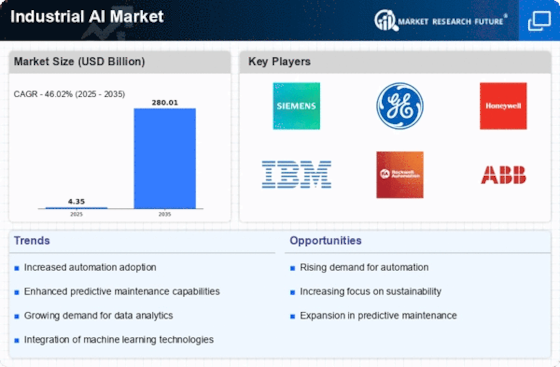Industrial Ai Size
Industrial AI Market Growth Projections and Opportunities
The Industrial AI market is undergoing dynamic changes driven by the integration of artificial intelligence (AI) technologies into industrial processes to enhance efficiency, productivity, and overall operational performance. This market revolves around leveraging AI applications such as machine learning, computer vision, and predictive analytics to optimize manufacturing, maintenance, and supply chain operations. The dynamics of the Industrial AI market are influenced by factors such as the increasing focus on automation and Industry 4.0, advancements in AI technologies, the need for predictive maintenance, and the growing demand for data-driven decision-making in industrial settings.
A key driver of the Industrial AI market is the increasing focus on automation and Industry 4.0. Industries are embracing digital transformation to create smarter, more connected factories where machines, systems, and processes communicate and collaborate seamlessly. AI technologies play a crucial role in this evolution by enabling machines to analyze data, learn from it, and make intelligent decisions. The market dynamics are shaped by the recognition that Industrial AI is a key enabler of Industry 4.0, offering unprecedented opportunities to optimize operations, reduce costs, and enhance overall manufacturing efficiency.
Advancements in AI technologies contribute significantly to the dynamic nature of the Industrial AI market. As AI continues to evolve, industrial applications are becoming more sophisticated and capable of addressing complex challenges. Machine learning algorithms are employed for predictive maintenance, computer vision enhances quality control, and AI-driven analytics optimize supply chain management. The market is responsive to solutions that harness the latest advancements in AI, allowing industries to stay competitive by adopting cutting-edge technologies that provide tangible operational benefits.
The need for predictive maintenance is another significant factor shaping the dynamics of the Industrial AI market. Industries are increasingly adopting predictive maintenance strategies to minimize downtime, reduce equipment failures, and extend the lifespan of machinery. AI technologies analyze historical data, monitor equipment conditions in real-time, and predict potential issues before they occur. The market dynamics are influenced by the recognition that predictive maintenance can lead to significant cost savings and operational efficiency gains, driving industries to invest in AI solutions that offer predictive capabilities.
The growing demand for data-driven decision-making in industrial settings is a crucial factor influencing the dynamics of the Industrial AI market. As the volume of data generated in industrial processes increases, industries seek AI solutions that can derive meaningful insights from this data. AI-driven analytics provide actionable intelligence, enabling decision-makers to optimize production schedules, identify areas for improvement, and enhance overall operational efficiency. The market is characterized by a shift towards data-driven decision-making, where industries recognize the value of AI in extracting actionable insights from vast amounts of industrial data.
Moreover, the competitive landscape within the Industrial AI market is marked by a diverse range of players, including industrial automation companies, technology vendors, and specialized AI solution providers. This competition fosters innovation as providers strive to differentiate themselves by offering unique AI solutions tailored to specific industrial processes and needs. Solutions that can seamlessly integrate with existing industrial systems, demonstrate scalability, and provide measurable improvements in operational efficiency gain traction in the market, shaping the competitive dynamics and encouraging continuous advancements in AI for industrial applications.



















Leave a Comment